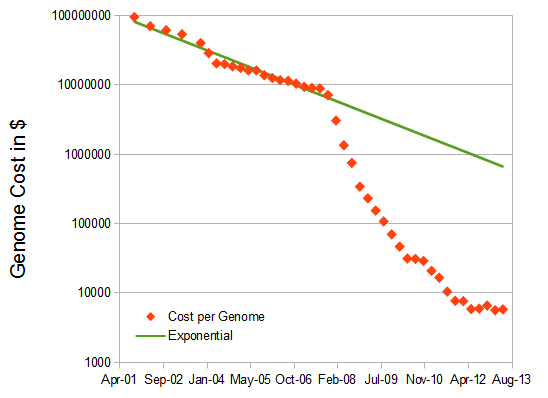This is something that is well known to people working within the field of genetics but it is easy to forget that this is not widely appreciated. There has been a steady drop in the cost of sequencing a human genome. In 2001 it was $95 million and done with international government backing.
Many new technologies proceed according to Moore's law. The number of transistors on a computer's CPU, the cost per transistor, the number of pixels in a digital camera, computer hard drive capacity, car battery energy density, etc. I use this as an example in my class of how rapidly genetics is changing. Genetics is a field that is beating Moore's law! The data for the graph at top is from NHGRI. I fitted an exponential curve to the first 21 entries from September 2001 to October 2007. The fit is quite good with an  . However, after 2007 new, massively parallel, sequencing technologies came on the scene (454, Illumina, SOLiD) that drove the price down at an unprecedented rate. Now there is a rush to the $1,000 genome.
. However, after 2007 new, massively parallel, sequencing technologies came on the scene (454, Illumina, SOLiD) that drove the price down at an unprecedented rate. Now there is a rush to the $1,000 genome.
Various technologies are also continuing to be developed. One of these that many people are keeping a close eye on is MinION (link). It is a small $900 box that plugs into a USB port on your computer and can sequence long fragments of DNA quickly. It uses nanopore technology to track a single DNA molecule as it goes through a tiny hole and electrically senses the sequence of bases in seconds. So far it has been demonstrated to sequence 48,000 bp viral genomes.
In addition to sequencing, genotyping variable sites to determine which alleles a person has has also become amazingly cheap. I am still astounded that 23andme can genotype a million SNPs for $99 using Illumina's BeadChip technology.
To underscore the rapidly changing field of personal genomics in previous years I had a slide of James Watson and Craig Venter in my class' first lecture of the semester, two people that have had their genomes sequenced. This year I added myself to the next slide--because of my genome-wide genotyping results--to show that this type of technology is rapidly becoming available to everyone.
